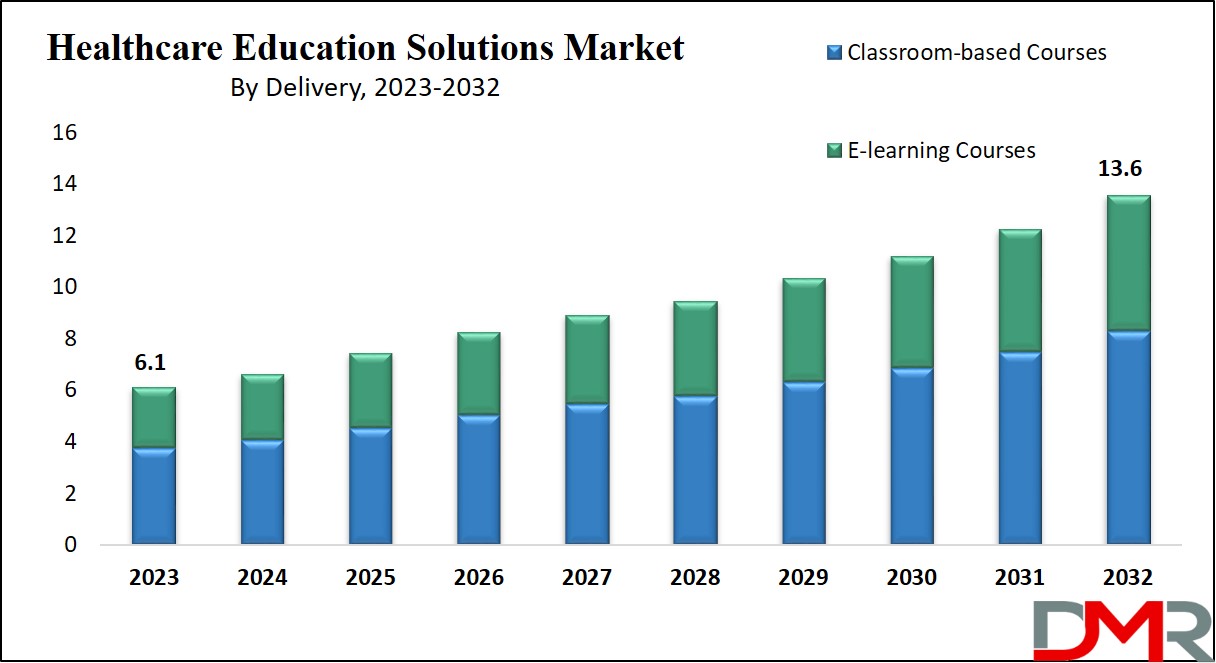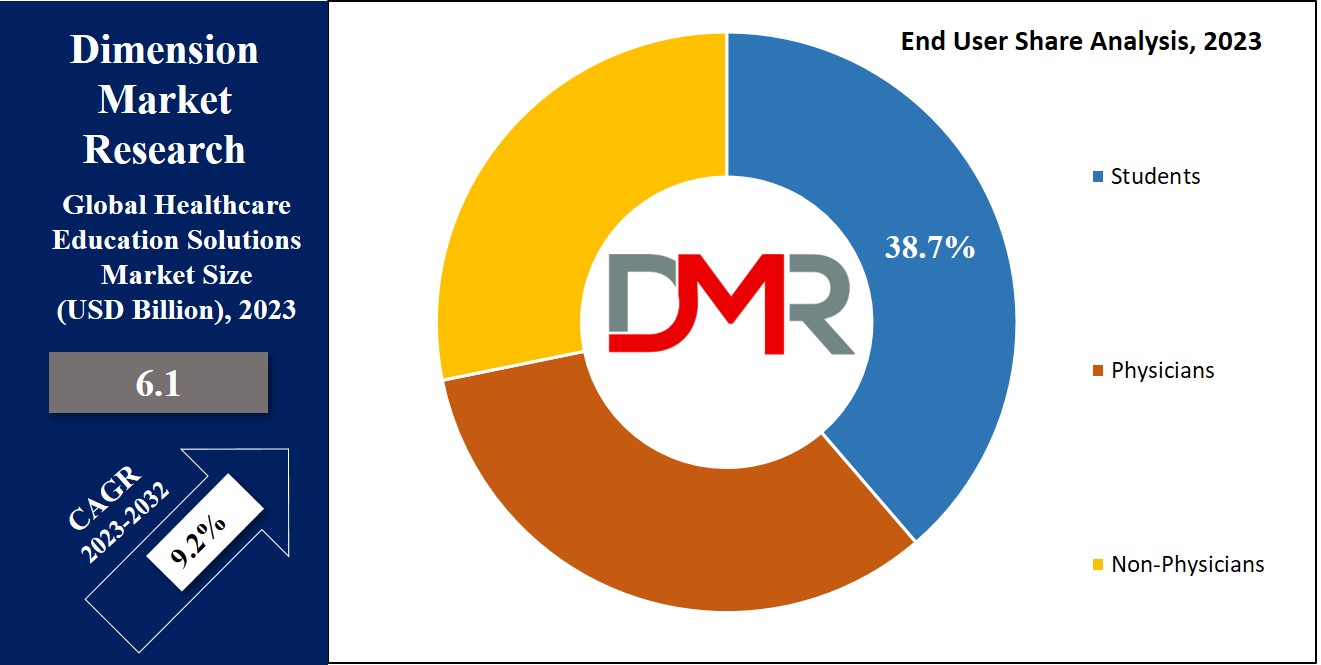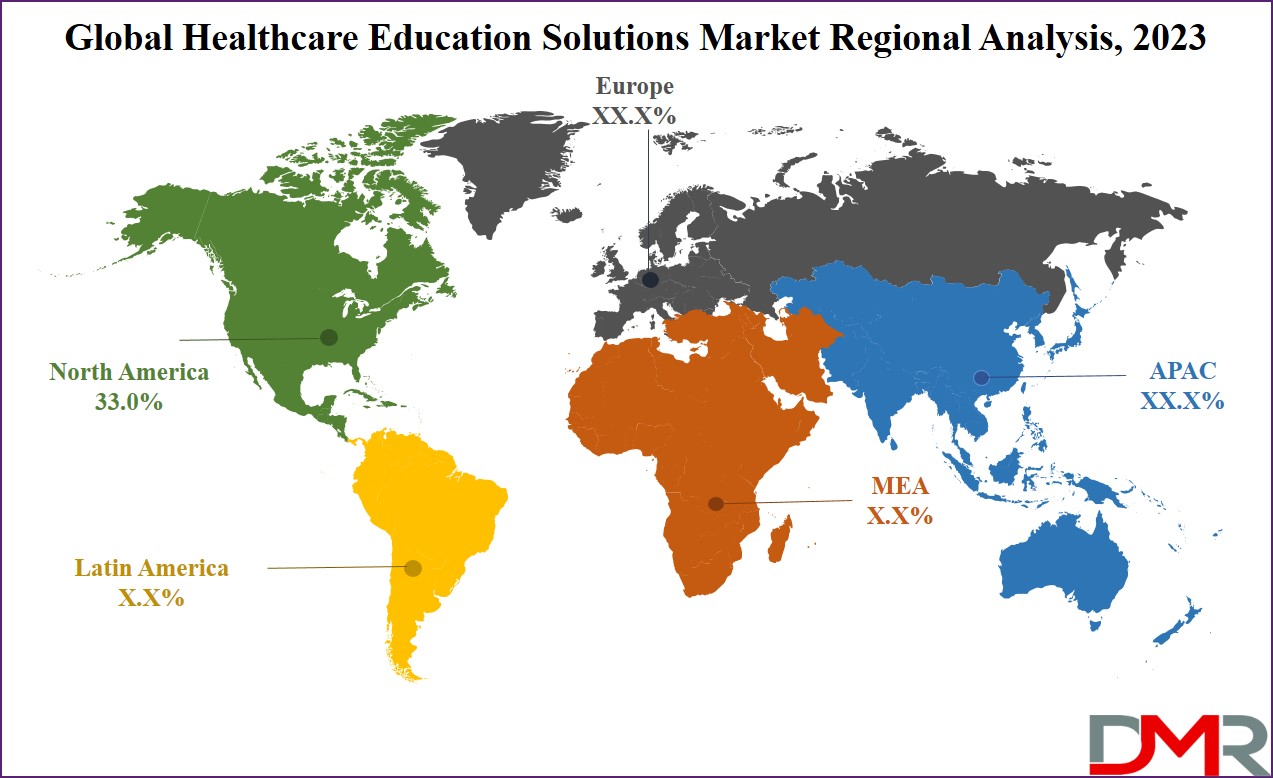Market Overview
The
Global Healthcare Education Solutions Market is expected to reach a value of
USD 6.1 billion in 2023, and it is further anticipated to reach a market value of
USD 13.6 billion by 2032 at a
CAGR of 9.2%.
The modernization of healthcare institutions, including computer systems & software applications, involves training for
healthcare workers to deliver efficient services. Services like diagnostics, laboratory investigations, patient treatment records, & hospital admissions depend on these technologies.

ℹ
To learn more about this report –
Download Your Free Sample Report Here
Manual handling of vast patient data, treatment records, & diagnostics creates a significant risk of errors, focusing the importance of proficient training in the use of these advanced systems for accurate & reliable healthcare delivery.
As per icahn.mssm.edu A comprehensive study led by Mount Sinai researchers demonstrated that transcatheter mitral valve repair for heart failure patients with mitral regurgitation significantly reduces long-term hospitalization rates by nearly 50% and mortality by almost 30%. Patients undergoing this procedure experienced improved well-being, fewer hospitalizations, and extended survival.
According to thetimes A comprehensive study involving over 35,000 participants found that regular physical activity can extend life expectancy by up to 11 years. Participants in the highest activity quartile had a 73% lower risk of premature death compared to the least active group.
As per bhw.hrsa.gov In 2023, the U.S. healthcare sector employed over 17 million individuals, making it the nation's largest employment sector. Despite this, significant workforce shortages persist, particularly in primary care and rural areas. As of June 2024, approximately 75 million people resided in primary care Health Professional Shortage Areas (HPSAs).
The Global Healthcare Education Solutions Market is experiencing significant growth as healthcare institutions search for innovative ways to enhance training and education. Key drivers include an increasing demand for skilled healthcare professionals as well as digital learning tools like e-learning platforms, virtual simulations and AI-powered educational solutions to address this growing demand.
Recent advances include the incorporation of immersive technologies like AR and VR into healthcare training, giving medical students and professionals access to hands-on experience within a controlled, risk-free environment that enhances learning outcomes and better prepares them for real world clinical scenarios.
Healthcare education solutions continue to grow due to a need for continuous professional development. Healthcare workers must stay up-to-date with medical knowledge, technologies and best practices - prompting an increase in online courses, certifications and remote learning platforms that offer flexibility and accessibility so professionals can easily improve their skillsets.
Opportunities in this market are expanding, particularly in emerging economies with rapidly developing healthcare infrastructure and education systems. Governments and private organizations alike are investing heavily in healthcare education programs - creating an opportunity for providers of digital training solutions to capitalise. Furthermore, personalized learning analytics are creating new paths of innovation in healthcare training and development programs.
Market Dynamic
Over recent years, alternative educational methods have gained high acceptance, as online education solutions aim to empower learners by maintaining control over the learning process & encouraging an engaging environment with customizable features to enhance learning abilities, which is particularly advantageous for
medical professionals looking to stay current, enabling them to preview courses before payment & complete classes at their own pace.
Adaptive learning, which uses AI to personalize content based on user performance, is becoming highly significant, which is challenging in traditional settings but proves effective in online education, mainly for users with diverse backgrounds & aptitudes. Further, in the coming years, adaptive learning is expected to be a significant opportunity for digital education providers.
However, in many developing countries, limited access to reliable internet & electricity remains a hurdle, as stable connections are essential for online coursework, & technological equipment requiring reliable power sources. Some regions in the Asia Pacific, the Middle East, and Africa lack robust infrastructure, impacting students' access to online education. Despite these challenges, increasing govt initiatives to improve digital infrastructure in these areas are expected to facilitate increased access to online education services in the future.
Research Scope and Analysis
By Delivery
The classroom-based segment is expected for significant market share growth in the forecast period, with a predominant share in 2023. Classroom training stands out for its human contact, a major advantage is the lack of online learning. Leading providers like Braun, Becton, Dickinson & Co. (BD), and GE Healthcare are instrumental in providing healthcare education solutions in this segment.
For instance, aligned with Vermont Education Quality Standards (EQS), each Supervisory Union/Supervisory District/Unified District (SU/SD/UD) is required to advance a curriculum meeting State Board of Education standards, which ensures students engage in rigorous, relevant, & comprehensive learning experiences, supporting proficiency in health & other content areas, thereby driving market growth in the region.
By Application
The market is segmented by application type into Cardiology, Neurology, Oral & Maxillofacial, Pediatric, Radiology, Laboratory, and Others. Among these, Cardiology holds the largest market share in 2023, and this dominance is anticipated to persist throughout the forecast period, as the number of heart-related conditions is expected to rise, necessitating an increased need for cardiothoracic education.
Furthermore, there is substantial growth expected in the laboratory & radiology segments in coming years, driven by an increasing awareness of personal health. As more individuals give importance to health consciousness, the laboratory & radiology industries are predicted to experience significant growth, which aligns with the growing importance placed on preventive healthcare, indicating a switch towards proactive health management, thereby influencing the dynamics of the healthcare education solutions market over the coming years.
By End User
The global healthcare education solutions market is divided by end-users into students, physicians, and non-physicians, where the students segment captured a substantial revenue share in 2023, which is driven by the growing popularity of Continuous Medical Education (CME) programs & the technological development within the healthcare industry.
Also, the integration of advanced technologies has allowed the delivery of high-quality training at affordable costs, making it more accessible to students. The dependency on lifelong learning in the healthcare sector, mainly for aspiring medical professionals, has driven the need for educational solutions customized to the evolving landscape.

ℹ
To learn more about this report –
Download Your Free Sample Report Here
The Healthcare Education Solutions Market Report is segmented on the basis of the following:
By Delivery
- Classroom-based Courses
- E-learning Courses
By Application
- Cardiology
- Neurology
- Oral & Maxillofacial
- Pediatric
- Radiology
- Laboratory
- Others
By End User
- Students
- Physicians
- Non-Physicians
Regional Analysis
North America plays a significant role in the Healthcare Education Solutions Market, holding a major 33.0% share of the market in 2023, which is expected to fuel substantial growth globally. This region's prominence is owing to its advanced & well-established healthcare industries, mainly in highly developed nations like the US & Canada.
Further, the market's momentum in North America is driven by factors like several provider penetration & a substantial patient population entailing a group of well-trained professionals. These elements build a strong foundation for sustained growth during the forecast period. The region's commitment to healthcare education solutions aligns with the changing demands of the industry, positioning North America as a major driver in shaping the trajectory of the global healthcare education market.

ℹ
To learn more about this report –
Download Your Free Sample Report Here
By Region
North America
Europe
- Germany
- The U.K.
- France
- Italy
- Russia
- Spain
- Benelux
- Nordic
- Rest of Europe
Asia-Pacific
- China
- Japan
- South Korea
- India
- ANZ
- ASEAN
- Rest of Asia-Pacific
Latin America
- Brazil
- Mexico
- Argentina
- Colombia
- Rest of Latin America
Middle East & Africa
- Saudi Arabia
- UAE
- South Africa
- Israel
- Egypt
- Rest of MEA
Competitive Landscape
The healthcare education solutions market is showcasing partial fragmentation with the presence of multiple key players. Many key companies contribute to the market, each playing a significant role, which fosters competition & innovation within the industry, driving advancements in healthcare education technologies and ensuring a dynamic and evolving market landscape
In May 2022, The London Healthcare Education Group (LHEG), an important part of London Higher, unveiled a project fund of EUR 30,000, with a main focus on backing collaborative & innovative healthcare education initiatives that bring value to London. Further, these projects should involve at least two universities or a university & a partnering organization, to provide measurable outcomes that enhance healthcare education in the London region.
Some of the prominent players in the global Healthcare Education Solutions Market are:
COVID-19 Pandemic & Recession: Impact on the Global Healthcare Education Solutions Market:
The COVID-19 pandemic and the following economic recession significantly influenced the global healthcare education solutions market, as an increase in focus on public health & the strain on healthcare systems allowed for an increased demand for innovative & accessible education solutions. Virtual learning platforms, simulation technologies, & online resources experienced a growth in adoption as traditional in-person training faced challenges.
However, economic uncertainties led to budget constraints in the healthcare sector, impacting investment in education solutions. However, even after these challenges, the pandemic highlighted the importance of flexible & technology-driven healthcare education, creating the path for continued growth in the market as stakeholders adapt to a rapidly evolving landscape and prioritize the development of resilient & future-ready healthcare professionals.
Report Details
| Report Characteristics |
| Market Size (2023) |
USD 6.1 Bn |
| Forecast Value (2032) |
USD 13.6 Bn |
| CAGR (2023-2032) |
9.2% |
| Historical Data |
2017 - 2022 |
| Forecast Data |
2023 - 2032 |
| Base Year |
2022 |
| Estimate Year |
2023 |
| Report Coverage |
Market Revenue Estimation, Market Dynamics, Competitive Landscape, Growth Factors and etc. |
| Segments Covered |
By Delivery (Classroom-based Courses and E-learning
Courses), By Application (Cardiology, Neurology, Oral
& Maxillofacial, Pediatric, Radiology, Laboratory, and
Others), By End User (Students, Physicians, and Non-
Physician) |
| Regional Coverage |
North America – The US and Canada; Europe – Germany, The UK, France, Russia, Spain, Italy, Benelux, Nordic, & Rest of Europe; Asia- Pacific– China, Japan, South Korea, India, ANZ, ASEAN, Rest of APAC; Latin America – Brazil, Mexico, Argentina, Colombia, Rest of Latin America; Middle East & Africa – Saudi Arabia, UAE, South Africa, Turkey, Egypt, Israel, & Rest of MEA
|
| Prominent Players |
GE Healthcare, Stryker, SYMPLR, Medtronic, Olympus
Corp, Coursera Inc, Zimmer Biomet, ADP, Infor,
Cerner Corp, and Other Key Players |
| Purchase Options |
We have three licenses to opt for: Single User License (Limited to 1 user), Multi-User License (Up to 5 Users), and Corporate Use License (Unlimited User) along with free report customization equivalent to 0 analyst working days, 3 analysts working days and 5 analysts working days respectively. |
Frequently Asked Questions
How big is the Global Healthcare Education Solutions Market?
▾ The Global Healthcare Education Solutions Market size is estimated to have a value of USD 6.1 billion in
2023 and is expected to reach USD 13.6 billion by the end of 2032.
Which region accounted for the largest Global Healthcare Education Solutions Market?
▾ North America has the largest market share for the Global Healthcare Education Solutions Market with a
share of about 33.0% in 2023.
What is the growth rate in the Global Healthcare Education Solutions Market?
▾ The market is growing at a CAGR of 9.2 percent over the forecasted period.
Who are the key players in the Global Laser Technology Market
▾ Some of the major key players in the Global Healthcare Education Solutions Market are GE Healthcare,
Stryker, ADP, and many others.